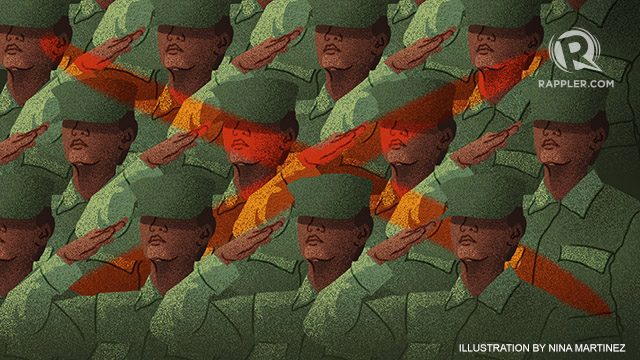SUMMARY
This is AI generated summarization, which may have errors. For context, always refer to the full article.
 Palace officials have begun deliberating the move to reinstate the mandatory nature of the Reserve Officers Training Corps (ROTC), with President Rodrigo Duterte’s cabinet including the topic in their fourth regular meeting on Monday, August 1.
Palace officials have begun deliberating the move to reinstate the mandatory nature of the Reserve Officers Training Corps (ROTC), with President Rodrigo Duterte’s cabinet including the topic in their fourth regular meeting on Monday, August 1.
This move follows Duterte’s pronouncement in his first State of the Nation Address that there is a need to strengthen ROTC to “instill love of country and good citizenship.”
Moves to reinstate mandatory ROTC are not new. Since the passage of Republic Act 9163 in 2002, which made the ROTC program only one of the options under the National Service Training Program (NSTP), militarymen-turned-legislators have continually pushed for the reservist program to be brought back to its glory days.
Backers of the move to make ROTC mandatory again argue that it would help “teach discipline and nationalism.” Others, like newly-elected Senator Win Gatchalian, turn to the escalating sea dispute in the West Philippine Sea, saying that the revival of mandatory ROTC would “help drive the point that although we are a small nation in economic and military terms, we will never back down from our fight for sovereignty in the West Philippine Sea.”
While these arguments may sound good at first, both do not necessarily hold water under closer scrutiny.
The militarist argument
First, supporters of the mandatory ROTC link the issue to the West Philippine Sea, arguing that it will ensure that the nation has enough military reservists if ever the dispute escalates to war.
However, such line of thinking implies that sooner or later, we have to face off with China, that war is inevitable. It undermines current diplomacy measures being undertaken by the national government to resolve the dispute.
More importantly, ramping up the ranks of military reservists through mandatory ROTC does not necessarily translate to a stronger armed forces capable of defending Philippine territory if push comes to shove.
The move does not answer the fact that we have a vastly dilapidated territorial defense system, no thanks to the corruption-ridden AFP Modernization Program – which, to date, has spent almost P100 billion for procuring mostly refurbished equipment.
In a way, the mandatory ROTC campaign may even be viewed as a smoke-and-mirrors move meant to placate longstanding criticism on our territorial defense capabilities.
A violent past
Making ROTC mandatory again is also not tantamount to magically instilling nationalism in the Filipino youth. In contrast, the program has in fact led to countless violations of students’ rights.
The ROTC program has long been criticized for being an avenue for continuing abuse and violence against student cadets. In our education system, in fact, no other education program holds the most violent record.

It should be remembered that RA 9163 or the NSTP Law was passed precisely due to the strong backlash against the murder of University of Santo Tomas student Mark Welson Chua, who was killed in January 2001 following his exposition of the corruption in the UST ROTC program. Since the passage of the NSTP Law in 2002, the violence surrounding the ROTC has not dissipated.
Back in 2014, students from the Polytechnic University of the Philippines reported acts of violence through hazing and corporal punishment being committed by PUP student officials. Two of the victims were female.
More recently, a viral video from the University of Mindanao-Tagum showed student cadets being punched repeatedly in the chest and stomach. These acts of violence continue, despite the reservist program being optional at present.
Instilling nationalism?
Finally, there is a need to address the notion that ROTC will be instrumental in instilling nationalism. Such view limits the definition of nationalism as being able to defend the nation by learning to wield a gun, a definition that is bereft of historical and social context.
When the 1986 Constitutional Commission was deliberating on Article XIV of the 1987 Constitution, Commissioner Rene Sarmiento said that there are at least three dominant definitions for nationalism – the “barangay-Tagalog” nationalism which refers to regionalist notions; the “tinikling” nationalism which reduces nationalism to mere symbolism; and a third, more comprehensive type, which he discussed as follows.
“Filipino nationalism is the determination to uphold the sovereignty of the Filipino people, the right of the Filipinos to freely decide the destiny of the nation — that is, the kind of government we should have and who should run it; what is the common good and how to attain it; how our society should be structured; how the wealth of our land and seas should be used, developed and shared; and how our culture should be preserved and enhanced. Filipino nationalism is more than patriotism. It is more than the love of land and people, loyalty to flag and country and readiness to sacrifice personal interest for the common good. It is the firm resolve never to allow our people to be dominated, controlled by foreign powers or domestic tyrants and to oppose totalitarianism, imperialism, and hegemony with all the means at our command.”
That third type of nationalism, the kind of nationalism that the framers of the Constitution envisioned when they wrote the Article XIV Section 3 (2) which mandates all educational institutions to “inculcate patriotism and nationalism,” is precisely the type of nationalism that the ROTC cannot teach.
For that type of nationalism precisely mandates schools to inculcate, for the large part, a sense of volunteerism, for students to pursue worthy advocacies and even activism. What the framers of the Constitution envision is not only an army of young reservists, but a generation of youth ready to battle against society’s ills, including poverty, hunger, illiteracy, and to a higher level, foreign domination in our country’s economic affairs.
What we need is a better path for the socio-civic involvement of the youth, a path that is congruent to the challenges of the changing times.
That path simply does not lead to ROTC. For how can a program that the AFP once used to install “student intelligence networks” meant to infiltrate and spy on student organizations and advocacy groups lead to active socio-civic engagement of the youth? How can a program that still cannot rid itself of its violent past post as a solution to apathy?
Clearly, mandatory ROTC is out of step with the changing times, and the changing needs of the nation. – Rappler.com
Marjohara Tucay is the national president of Kabataan Partylist.
Add a comment
How does this make you feel?
There are no comments yet. Add your comment to start the conversation.